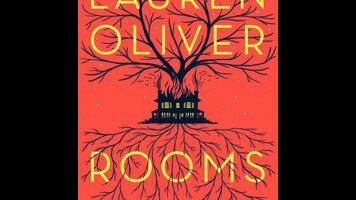
Haunted houses have two distinct flavors. In one, a terrible act reverberates throughout history, and the remnants of that act lodging themselves in the walls and rooms of the home. In the other, the house itself is a presence, a character in its own story. The haunting spirit is not the ghost of a person or an event, but simply the spiritual embodiment of what the house is. Lauren Oliver’s Rooms picks the former, creating an old mansion in the Northeast that is haunted by distinct personalities bearing their own quibbles with the world and one another. Intriguing as that is, Rooms never finds the right balance, telling too many stories in an attempt to have its cake and eat it, too.
After the death of their father, Minna and Trenton return to their childhood home to sort through his things and execute his will. While the siblings fight and fret over their alcoholic mother, two ghosts watch from inside the walls. Alice, the older of the two, is a priggish housewife whose need for quiet is constantly disturbed by the family and her co-spirit, Sandra. Sandra is loud and judgmental, providing a chorus-like commentary on the family at odds inside the house. Then, out of nowhere, a new ghost appears, and other mysteries begin piling up for both the living and the dead.
In many ways, Rooms resembles the melodramas of Douglas Sirk more than it does other haunted house novels. There’s nothing “spooky” in Oliver’s narrative. Instead, Rooms presents a series of interactions where people, alive and dead, talk past each other, miscommunicate, or struggle to reveal what they really feel, which leads a reader to ask: Why include ghosts at all?
As they stand, Alice and Sandra are distinct voices with interesting backstories (Alice’s descriptions of the past in particular are quite vivid), but they, for the most part, remain passive observers to Minna and Trenton’s plight. The ghosts’ tangential relationship to the main story (brought about purely by the fact that they all inhabit the same house) means that their commentary doesn’t really reveal anything about the people they observe. Oliver further undercuts the “ghost as chorus” element by having chapters from the perspectives of her live characters. If the author had focused Rooms so that it was entirely told by Alice and Sandra, she’d have an interesting meditation on observation, voyeurism, and perspective. Unfortunately, as only two of many voices, they lose their privileged position, and don’t have anything else to distinguish themselves.
This problem of “too many voices” spills out into the plot as well. Rooms has close to a dozen subplots in its brisk 300 pages (including a cancer scare, a missing girl, a murder, and an affair, to name only a few). Many of these are left by the wayside, and their impact on the larger narrative ranges from unclear to downright inconsequential. Others are half-baked, and feel like digressions that should have been cut out during the editing process. There’s nothing wrong with a sprawling narrative that wrangles many perspectives and subplots, but they usually work better in epic stories or high fantasy, not a family drama that mostly sticks to a single, small setting.
Ultimately, Rooms is a frustrating read, a book that has promise but fails in its execution. Ostensibly Oliver’s two spirits are at its center, but as she ever-widens her gaze, they recede into the periphery, until it’s not clear why they’re there at all.